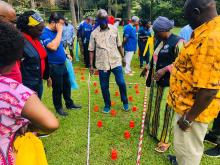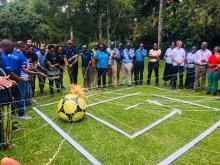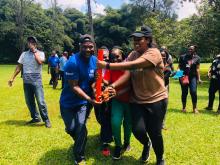WHO Uganda Staff Retreat To Assess Annual Achievements, Plan for the future and build a Cohesive Team
Mbale, 5 November 2019:- Retreats provide a good opportunity for staff to understand each other, reflect on working relationships, and network, which leads to team building and cohesion. Most importantly, retreats are ideal to review office achievements, reflect on working modalities and to plan for the work ahead.
These and more were the outcomes of the two-day annual World Health Organization (WHO) Uganda Country Office retreat held recently in the eastern town of Mbale from 31st October to 1st November under the theme: “The Pathway to Success”.
Led by WHO Representative in Uganda Dr Yonas Tegegn Woldemariam, the staff reviewed the implementation status of the current WHO Uganda Country Cooperation Strategy (CCS 2016-2020). They also agreed on modalities to frontload implementation of the Program Budget (PB 2020-2021) and appraised the working arrangements.
They also proposed improvements to foster a better office working environment.
“We will get the best out of this retreat if you give it your passion, commitment and energy,” Dr Yonas advised as he formally opened the retreat. “We have to come out with good recommendations if we are to build a good country office that is able to deliver on agreed products,” he said.
The retreat came at a critical time in WHO when member states are demanding for more transparency, accountability and results. Indeed, this is the motivating force behind the transformation agenda and functionality review of the office that is currently on-going.
“I encourage you all to positively embrace the changing dynamics of the organization. They are meant to improve WHO’s efficiency and effectiveness in health service delivery in Uganda and in all member states,” Dr Yonas pointed out. With that in mind, the staff delved into the workshop programme determined to improve teamwork, reflect on repositioning WHO’s work in the changing context of the global and regional health priorities and their implications for Uganda.
Assessment of the 2016-2020 CCS revealed some gaps that need addressing and some issues that will inform or be included in the next CCS which is already under development. As a reminder, the CCS is a medium-term vision for WHO's technical cooperation with a given Member State and supports the country's national health policy, strategy or plan.
The presentation on the next Programm Budget (PB) indicated to staff the priorities of the organization, targets, expected results and how to monitor their achievement.
The overall message from this presentation was the need for early planning in consultation with national authorities.
“Early submission of work plans ensures timely discussions with partners and early implementation,” noted Dr Suraj Man Shrestha, the Programme Management Officer who led the discussions on that topic.
To foster team building and cohesion, staff participated in various outdoor games that highlighted different attributes needed in an efficient and effective office. These included leadership, effective communication, mutual support, team encouragement, following instructions, respecting hierarchy, time-keeping among others.
The retreat was a resounding success that sharpened focus and cohesion among staff, addressed pertinent managerial and administrative issues as well as clarified WHO priorities in Uganda.
“We need to have more of these on a regular basis at the cluster or office level. This is good for staff and the organization as a whole,” said Dr Yonas at the end of the retreat





